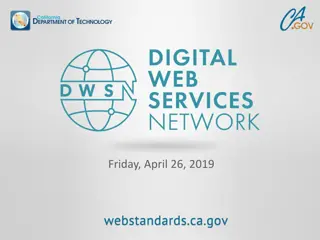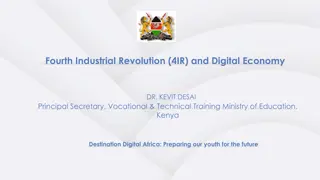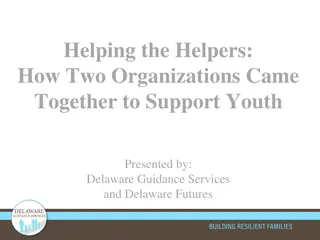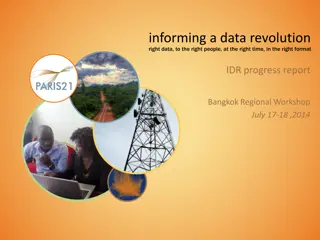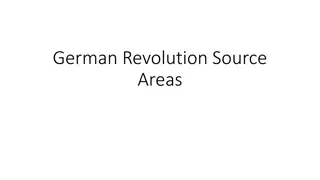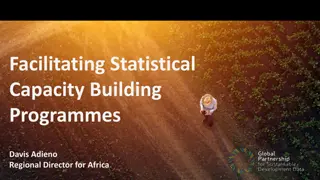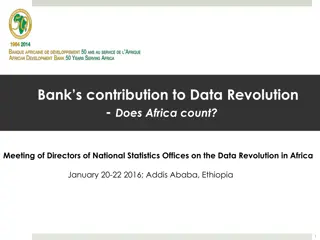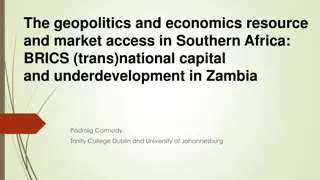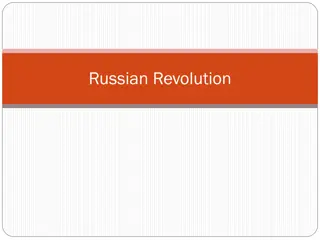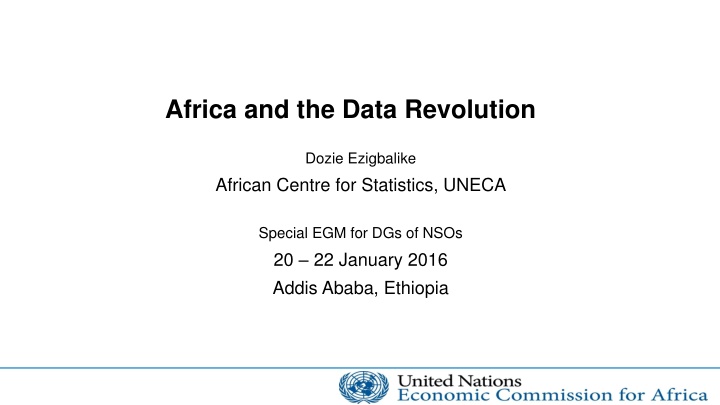
Unleashing Africa's Data Revolution: A Comprehensive Overview
Explore the key insights from discussions on Africa's data revolution, redefining priorities and implementation strategies. The importance of embracing diverse data sources, tools, and technologies in decision-making, service delivery, and citizen engagement is highlighted, emphasizing Africa's ownership of its narrative.
Download Presentation

Please find below an Image/Link to download the presentation.
The content on the website is provided AS IS for your information and personal use only. It may not be sold, licensed, or shared on other websites without obtaining consent from the author. If you encounter any issues during the download, it is possible that the publisher has removed the file from their server.
You are allowed to download the files provided on this website for personal or commercial use, subject to the condition that they are used lawfully. All files are the property of their respective owners.
The content on the website is provided AS IS for your information and personal use only. It may not be sold, licensed, or shared on other websites without obtaining consent from the author.
E N D
Presentation Transcript
Africa and the Data Revolution Dozie Ezigbalike African Centre for Statistics, UNECA Special EGM for DGs of NSOs 20 22 January 2016 Addis Ababa, Ethiopia
Central Messages Definition of data revolution that is not based on exists Priority to implementation Principle 5 of Fundamental Principles Re-interpreting the definition
A Definition of Data Revolution An explosion in the volume of data, the speed with which data are produced, the number of producers of data, the dissemination of data, and the range of things on which there is data, coming from new technologies such as mobile phones and the internet of things , and from other sources, such as qualitative data, citizen-generated data and perceptions data... [SG s Data Revolution Group in A World that Counts ]
Concern for Africa With this definition, we are going to be left behind by the data revolution These things are not necessarily true in Africa
Interpretation Re-interpret data revolution NOT in terms of what exists which doesn t exist in Africa BUT in terms of what we need to do
Data Revolution: A Working Definition for Africa A Data Revolution in Africa is defined as the process of bringing together diverse data communities to embrace a diverse range of data sources, tools, and innovative technologies, to provide disaggregated data for decision-making, service delivery and citizen engagement; and information for Africa to own its narrative.
What is a Data Community? A data community refers to a group of people who share a social, economic or professional interest across the entire data value chain spanning production, management, dissemination, archiving and use
Example to explain the data community concept SDG Goal 2 End hunger, achieve food security and improved nutrition and promote sustainable agriculture
Explaining the data community concept (contd) By 2030, double the agricultural productivity and incomes of small-scale food producers, in particular women, indigenous peoples, family farmers, pastoralists and fishers, including through secure and equal access to land, other productive resources and inputs, knowledge, financial services, markets and opportunities for value addition and non-farm employment Target 2.3
Explaining the data community concept (contd) ensure sustainable food production systems and implement resilient agricultural practices that increase productivity and production, that help maintain ecosystems, that strengthen capacity for adaptation to climate change, extreme weather, drought, flooding and other disasters and that progressively improve land and soil quality Target 2.4
Explaining the data community concept (contd) Emphasis on Implementation Common misconception that development goals are about only monitoring and reporting Therefore, a tendency to collect data on agreed indicators to report on situation After the fact. Land has degraded, people may have died from floods, etc. Focus on Implementation Properly defined, should include documenting baseline situation, planning interventions, delivering services and monitoring progress to refine plans and actions The data will then be available to generate the indicators for reporting
Explaining the data community concept (contd) Proposed indicator for 2.3 Volume of production per labour unit (measured in constant USD), by classes of farming/pastoral/ forestry enterprise size Deconstruct the target: Did we double productivity? of small-scale producers? High volume does not necessarily meet the target because emphasis was on reporting on the indicator particularly women? secure and equal access to land? financial services?
Explaining the data community concept (contd) Secure and Equal Access Refocus on implementation data Identification of land parcels or units of holding and/or use Interests and rights recognized in land Ownership interests, grazing rights, access rights, group rights, management rights, etc. Current holders of the interests Including stakeholders Land capability and potential Suitability analysis Current uses Taxes and charges assessed; amount paid etc
Explaining the data community concept (contd) Not really new Land records and cadastres have been around Initially with emphasis on conveyancing and taxation Became multi-purpose in the 1980s, applying modern information technologies Countries have varying degrees of restrictions to access From complete public access conditions apply of course To near-complete secrecy except for owner Modern economic models recommend openness to the management of land information Country specific decisions on degree of openness
Explaining the data community concept (contd) Managing Land Record: The land Data Community There are experts, practitioners, officials, who: -Understand the concepts associated with this type of data, including best way to curate them and disseminate to wider society -Are in a position to collect the data in the course of normal work -Need them more than others in the course of their work, therefore have the strongest incentives to keep them updated Constitute them into a data community and give it mandate/credential to collect, curate and disseminate these datasets for everybody Define other data communities in similar fashion
Principle 5. Data for statistical purposes may be drawn from all types of sources, be they statistical surveys or administrative records. Statistical agencies are to choose the source with regard to quality, timeliness, costs and the burden on respondents.
Just Formalize it! How?
Develop a Data Revolution Implementation Strategy Start with high level political commitments to support key initiatives related to data revolution and statistical development Designate a coordinating government entity and secretariat Natural choice should be National Statistical Institute/Office Develop engagement and communication strategy Don t forget: governance arrangements Publicize the strategy and call for expression of interest Specific outreach to key data communities: include geospatial data community, government departments, CSOs, private, academic and research sectors Convene consultative meeting of stakeholders Endorse the governance arrangement Endorse the strategy Agree on priorities, actors and timeline for activities Proceed with the planned activities
Expanding the Data Ecosystem NOT all new data sources CAN fit into traditional/official statistical systems New sources constantly being discovered New uses evolving Some decisions do not need data to be stamped as official before using them
Data Ecosystem (contd.) The outcome document from the SDG negotiation process, submitted to the GA, emphasized that the follow-up and review of the implementation of the goals will be based on national official data sources The new development paradigm s leave no one behind and emphasis on accountability imply involving private citizens and other non-government actors in data production and curation.
So Expand the Ecosystem! How? Formalized data communities coordinated by NSOs
Key Issues and Challenges Not yet in the policy radar Must be underpinned by national policy with explicit provisions for open licensing, governance, partnership and capacity development Legal framework/environment Laws dealing with data and statistics need to be aligned to each other and to new data revolution concepts Competence of new data communities Data quality and curation principles Interfaces with each other and with the national statistical systems Competence of citizens To participate in data generation To consume information and get involved in accountability




